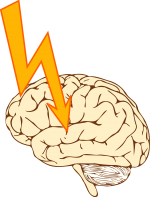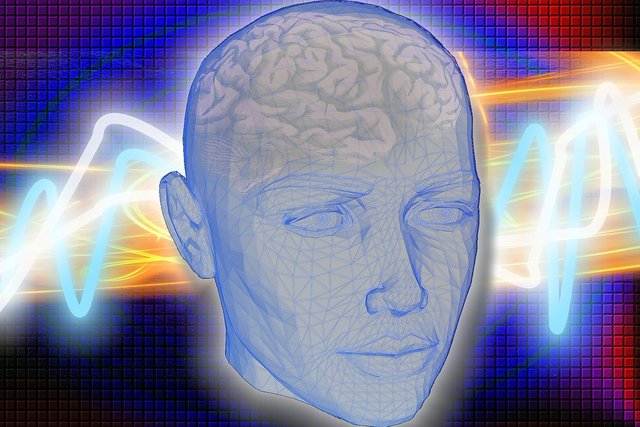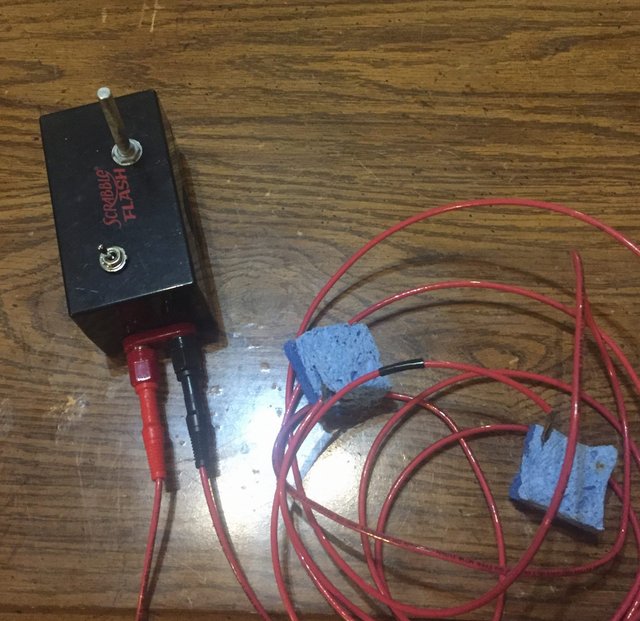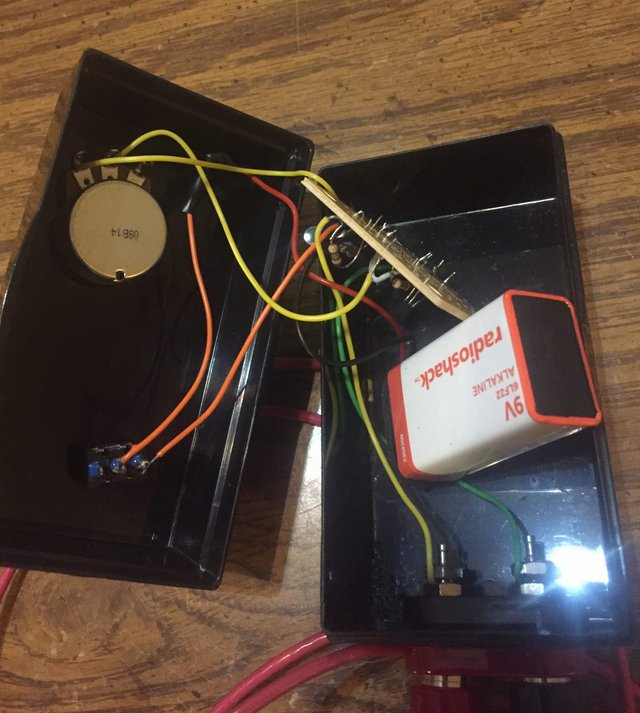Hotwiring My Brain With a 9-Volt - And Other Bizarre Things That Have Made My Brain Work Better
Over the last few months, I have snorted powders (not that kind of powder), zapped my head, ingested some pretty disgusting substances, and sent a vial of my spit across the country. Why have I done these things?
Because, I am scared that one day I will have Alzheimer’s. It runs in both sides of my family and I have seen my grandfather, a once brilliant man, slowly declining. This disease is personal to me and my family, and because of this, I have gone to extreme lengths to find ways to mitigate the effects and hopefully to prevent it.
I have discovered, in the course of self-experimentation and research, five things that make my brain work better. No, this list will not include clean diet, exercise, caffeine, meditation or any of the things you would normally find on a list like this. This is the antithesis of the smarmy health blog countdown lists you’ll find on Facebook. A word of warning, I am not a doctor, and I am not suggesting that you do the following. I am simply listing things I have done, that have had efficacy for me.
Nootropics
1. Noopept (up the nose)
As I embarked on my biohacking journey, one of the first things I came across was Noopept. This substance was invented by the Russians in the 70’s and its scientific name is N-phenylacetyl-L-prolylglycine ethyl ester. That’s a mouthful. The substance was invented as a more powerful alternative to Piracetam (another smart drug developed by the Russians). There is a lot of anecdotal information available on Noopept, which I largely attribute to it being around since the 70’s. I was comfortable with the level of risk I found, and did not see any side effects that I was not comfortable with risking. It seemed to be relatively safe in small doses while still being effective.
So, after doing my research on reputable vendors, I went to powdercity.com and ordered 1 gram of Noopept along with some other nootropics and a scale that measured down to .001 grams. When it arrived, I was sorely disappointed with the results. Nothing. After everything I’d read on the stuff, it was a dud. That’s when I discovered the subject of bioavailability. That was the key. The substance worked, but in order for this to happen, you had to give it the best possible chance of breaking the blood-brain barrier. I kept reading and quickly found that the most effective means of taking it was snorting it. The mucus membranes in the nose absorb the substance better than any other method. So now, I logged onto ceretropic.com and ordered their Noopept nasal spray. The spray consists of Noopept dissolved in deionized water (it has to be deionized or the Noopept molecules will bind to the water molecules and will not mix evenly).
Put simply, it worked! One spray to each nostril will produce results in about 15 minutes. When I take it, I feel more focused, alert and I find that I can process things much faster. The effect fades after about an hour and a half with no crash. After using it on and off (I don’t take it every day) I have found that it is still just as effective as the first time I took it. There are a few other effects that are pretty interesting. I have found that I can articulate things more clearly in social situations. I have never been particularly awkward in social situations, but the added clarity allows me to be more social than I normally would be.
2. Aniracetam
Aniracetam is the second of 3 nootropics I take regularly. According to examine.com, “Anecdotally, Aniracetam has been know to aid in 'collective and holistic thinking', or putting the pieces of the puzzle together. It also increases blood flow and activity in the area of the brain known for this action, the association cortex.” I have found this to be very accurate. Because Aniracetam is fat-soluble, I take it in my morning smoothie with MCT oil. It is very bitter, so I also mix it with 3 raw eggs and a banana. The raw eggs also provide a source of choline, which is a precursor and building block for acetylcholine. Acetylcholine is an important neurotransmitter, and Aniracetam (and other racetams) causes more of it to be synthesized in the brain. The effects of Aniracetam last for about 2 hours after taking it. On top of being able to think more creatively and having a higher ability for problem-solving, I’ve found that Aniracetam also functions well at reducing anxiety if I am under stress.
3. Phenylpiracetam
The third and final nootropic I take regularly is Phenylpiracetam. This particular racetam has been officially banned by the olympics due to its stimulatory properties. This racetam is a phenylated version of Piracetam, which basically means that it is absorbed more easily by the body. In comparison to Aniracetam, the half-life (effects) of Phenylpiracetam last longer (around 4 hours). The effects are similar to Aniracetam and I have felt noticeable improvements in memory and focus. In addition, it has also been known to increase athletic performance and coordination as well as improving tolerance to colder temperatures. I have yet to test these effects, but I plan on trying this as a pre-workout to see if this is true for me.
Other Methods
4. tDCS - transcranial Direct Current Stimulation

Huh? This has by far been the most interesting and nerve-racking experiment I have done. The basic concept is by placing electrodes in certain spots on your head and running a small current through it, you can encourage neurons to fire in a certain way and affect things like learning ability, motor skills, and depression. In fact, DARPA (Defense Advanced Research Projects Agency, the Department of Defense’s research branch) has used tDCS to increase marksmanship in snipers. There is an entire community on Reddit (https://www.reddit.com/r/tDCS/) dedicated to the concept, and I was able to find an electrical schematic to make a homemade tDCS machine.
I bought most of the parts at RadioShack and housed my machine in a plastic box for Scrabble Flash (I liked the play on words). For electrodes I soaked kitchen sponges in a saline solution. Before I attached the electrodes to my head, I measured the amperes with a milliameter to ensure that I wasn’t going to fry my brain. Once everything checked out, I found the DARPA placement for accelerated learning on tdcsplacements.com. I put the electrodes in place and slowly turned the dial up. I could feel a tingling as I did. I held the electrodes in place with a Nike headband and proceeded to read through a dense article. I felt extremely focused and I was able to concentrate and process the information much quicker. I left the machine running for 30 minutes and gradually turned the dial back down. I noticed that the effects did not go away immediately and lasted for some time after the current was removed. In some studies, effects have been shown to last up to six months.
5. 23andMe.com
23andMe is a company that analyzes a cup of your spit and gives you in-depth information on your genetic makeup. This information is compiled in an easy-to-access online profile, which can then be plugged into any number of free and inexpensive analyzation tools. When I purchased my 23andMe kit, they were charging $99. At this point in time, it costs $199. In my opinion, at either of these prices, this information is a steal. Through this genetic information, I found that I have a mutation in my MTHFR gene. This mutation is fairly common and means that my body cannot properly methylate folic acid (Vitamin B-9) which affects my ability to properly absorb other forms of Vitamin B and to break down homocysteine protein. Without breaking down this protein, it builds in the blood and contributes to arterial disease. Most importantly, it contributes to mild cognitive impairment and Alzheimer’s. The solution was to find a multivitamin that contained methylfolate instead of folic acid, as methylfolate is already methylated and allows my body to properly absorb Vitamin B, as well as break down homocysteine. When I began taking the multivitamin, which I found through Thorne Research, I noticed a difference within the first week. I had more energy all around, which included increased cognitive clarity, less mental fatigue, and a general sense of well-being. There are so many things that your genetics can affect, and the good news is that, many times, you can take action based on that information to mitigate negative effects.
One Last Disclaimer: Again, I cannot stress enough that I am not providing medical advice. I have researched the treatments and products that I have used thoroughly and understand the risks of each one. In addition, the results I have shared should be treated as anecdotal. If you are considering doing any of these items, do your research, learn the risks and consult a medical professional. Having said that, I have included a few resources in the article that I found to be helpful, and for those that have any questions, I am happy to help!



You're going to want to be very careful with #4. I've seen what can happen if you don't limit the current.
Nice little cone shaped wound paths effectively lobotomising the person.
The scary thing about brain injury is that many of the neurons don't die until 48 hours after the initial insult; meaning you wont know until it's far too late.
http://www.sciencedirect.com/science/article/pii/S1388245709002934
Stay safe friends!
Agreed! The schematic I used limits the amperage that can go to the electrodes. I would recommend that anyone looking to experiment with tDCS research the equipment VERY carefully.
I studied molecular biology and biomedical science (ask @tuck-fheman if you want verification).
My nootropic tip is... Drop a ritalin right before you fall asleep.
You'll wake up feeling very energised on as little as two hours sleep, almost like it speeds up the sleeping process.
If done right, you'll feel clear headed the whole day.
Don't take genes too seriously. If you search for Dr. Bruce Lipton's lectures, you'll see that the environment informs the DNA, so it's not all DNA-related. I mean even if you google alzheimer and identical twins, you find studies which prove that people with the exact same DNA may have or may not have alzheimer:
https://www.sciencedaily.com/releases/2006/02/060206232300.htm
...
Now 55% difference with people having the exact same DNA isn't very "promising" in terms of predicting what the DNA does.
So don't worry too much about it. The biggest contributing factor is the mental attitude you carry. If you are engaged in life, you have some purpose, some activity that you love, then you have nothing to fear.
Geriatric diseases are for those who have entered the psychology of the situation that they are less active and they are just (sublimely) waiting to die, and thus their body triggers various conditions to confirm their sublime expectation.
For example, new pensioners are at the highest risk of dying because they are like "I won't be working anymore, what am I going to do now? I'll be sitting around just waiting to die" on a subconscious level - and lots of times that's precisely what happens near the time they get the pension. They feel "de-activated" when retired and this feeling is then translated to the body which "retires" on its own.
So the feelings, intentions and the mental attitude are running the show in ways that chemicals and genes don't. The biggest medical "anomaly" that highlights this, is the existence of multiple personality disorder. When an individual wears a different personality, they get a whole set of different pathological symptoms. Then they switch personality and they switch symptoms. In one personality they may be diabetic while in another they are ok. In one personality they may be blind or short-sighted and in another they are ok. Things like that vary depending the "software" that the mind is running at each given point. But for most people running just 1 software for their personality, they don't realize how that dominates what their body does.
I agree, and I know that we are still in the very early stages as far as understanding genetic science. The most helpful info for me was understanding the MTHFR gene, which has a pretty actionable fix that seems to have produced results for me. As far as the odds of getting Alzheimer's, I take the genetic predictions with a grain of salt. Thanks for the resource, I'll have to look more into Dr. Lipton!
He is a molecular biologist. He used single-cell organisms from which he extracted the DNA from the cell and realized that the cell operated normally. And then he asked, if DNA was controlling behavior, why is this cell working normally (except reproduction of course). So he quickly realized that DNA doesn't control behavior but it's the other way around. And then he built up from there, studying anomalies where DNA should do this and that (and didn't) or where the environment or person's attitude was more of a causal factor.
Btw, I've experimented myself with the electrode neural stimulation in the past and one thing I noticed was extreme reaction to stimuli. Say a mosquito flies near your ear and then you react quicker and more violently. Have you noticed something similar? (It's possible I've activated some weird neural cluster with the points I was touching the electrodes)
I haven't noticed any reactions like that, but I have not delved very far outside of the more mainstream placements. I am working right now to develop unbiased tests for these placements and I hope to test some of the other placements soon.
Upvote for shocking your brain!
(and the interesting links)
Thanks! I hope to put out more content on this subject!
seriously though, cool stuff . I purchased a synthetic ingredient that occurs naturally in matcha tea called L-Theanine
it's supposed to help with focus and adhd issues. I mixed it in with my powdered matcha tea.. I should test it more. I couldn't ever tell if it worked sometimes or was placebo
I've also used L-Theanine. I found it to be most effective when taken with a caffeine pill at a ratio of 2 Theanine:1 Caffeine. I was also suspicious of the placebo effect, but when I played with the dosage I noticed a difference in efficacy, which I don't think would align with it being a placebo effect.
Do you dismiss
generally, or are they just not part of your list ?
At first, your post felt a bit scary.
Taking into account how many people self-medicate drugs like alcohol or painkillers -which are proven to be bad for you- this post isn't that far out anymore.
I definitely don't dismiss any of those things, and I probably should have clarified that. All of those things are proven ways to ensure not only good brain function, but overall health (obviously). When I first started researching the topic, some of these substances seemed scary to me as well. After researching, I discovered that there was quite a bit of reputable scientific knowledge on them and it definitely lowered the scary-factor. I'm hoping that through my writing, people will discover that these things aren't as sketchy as they sound and maybe after doing their research they might even be helped by these things.
not to be "that guy", but marijuana and specifically CBD have some properties that are supposed to help with brain aging in Alzheimers and Parkinsons
Medical marijuana has just been legalized in my area, so maybe I can give that a try next, for science of course.
Great to see this info here. I've tried a lot of nootropics over the years, used to develop products for the dietary supplement industry. Most of the good ones are now prescription only here in New Zealand so I haven't kept up on them for the past few years.
Following your writings, thanks!
Thanks! It seems that the lack of FDA approval here in the States is actually working in our favor. I followed you as well!
Interesting stuff! Have you ever tried modafinil?
I haven't. I still want to do more research on it. At this point, I'm not comfortable enough with what I've found.
Right on, The brain stimulation is interesting. On kind of an opposite note I have played around with a bunch of EEG type hardware and the feedback it provides does make it easier to get into different brain wave states I think.
I have that on my list for my next experiments! What systems have you used? I was thinking about going with the NeuroSky, it seems to be the best value.
I have the headset from Emotiv, I bought mine probably 5 years ago though and they have rolled out many new versions since then. It came with a user friendly interface and a great community, no complaints! NeuroSky has been around for a long while to, they should be reputable as well
Thanks for sharing the new source of Noopept. I've always purchased it from PowderCity and I didn't know there was a Spray version. One thing I've always noticed after taking Noopept is how words just seem to flow. You never stumble on trying to come up with the right words.
That's so true, but it's not overstimulating like a 5-hour energy and it isn't scary like some of the amphetamines people take. Thanks for reading!
Very helpful info, thank you. Have you noticed any effects on your dreams when taking these substances?
Good question, I have not noticed anything too out of the ordinary. I mainly attribute this to the fact that I never take any of these supplements after 2 PM. Additionally, my dreams tend to be fairly erratic in general. I have begun tracking my sleep closely and I'm hoping to start identifying some trends. Eventually, I'm going to try and put together a post on the subject. Thanks for the feedback!
Cool. Some of the same substances are used by advanced lucid dreamers. https://www.amazon.com/Advanced-Lucid-Dreaming-Power-Supplements/dp/1430305428
Hmm...that might be worth exploring.